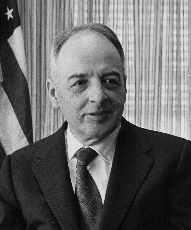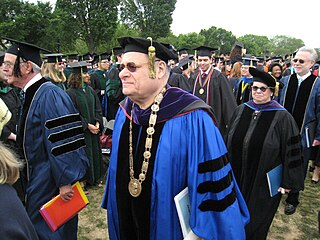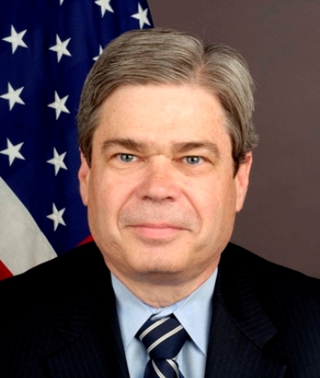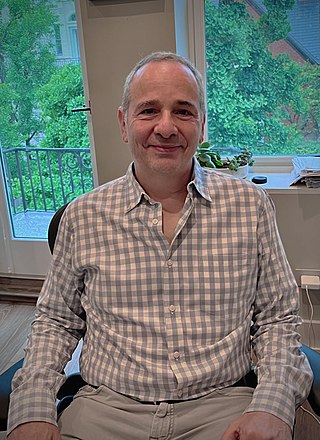Related Research Articles

William Daniel Phillips is an American physicist. He shared the Nobel Prize in Physics in 1997 with Steven Chu and Claude Cohen-Tannoudji.

Arthur Sherwood Flemming was an American government official. He served as the United States Secretary of Health, Education, and Welfare from 1958 until 1961 under President Dwight D. Eisenhower's administration. Flemming was an important force in the shaping of Social Security policy for more than four decades. He also served as president of the University of Oregon, Ohio Wesleyan University, and Macalester College. In 1966, he was elected to a four-year term as president of the National Council of Churches, the leading Christian ecumenical organization in the United States. From 1974 to 1981, he was the chairman of the United States Commission on Civil Rights.

George Robert Carruthers was an American space physicist and engineer. Carruthers perfected a compact and very powerful ultraviolet camera/spectrograph for NASA to use when it launched Apollo 16 in 1972. Carruthers was inducted into the National Inventors Hall of Fame in 2003, and in 2011 he was awarded the National Medal for Technology and Invention.

Andrew Felton Brimmer was an American economist and business leader who served as a member of the Federal Reserve Board of Governors from 1966 to 1974. A member of the Democratic Party, Brimmer was the first African American to sit on the Board.

Stephen Joel Trachtenberg was the 15th President of the George Washington University, serving from 1988 to 2007. On August 1, 2007, he retired from the presidency and became GW's President Emeritus and University Professor of Public Service at the Trachtenberg School of Public Policy and Public Administration.
The Presidential Management Fellows (PMF) Program is a two-year training and leadership development program at a United States government agency, administered by the U.S. Office of Personnel Management (OPM), for advanced degree holders. After completing the program, agencies may convert PMFs to permanent federal civilian employees.
The Presidential Early Career Award for Scientists and Engineers (PECASE) is the highest honor bestowed by the United States federal government on outstanding scientists and engineers in the early stages of their independent research careers. The White House, following recommendations from participating agencies, confers the awards annually. To be eligible for a Presidential Award, an individual must be a U.S. citizen, national, or permanent resident. Some of the winning scientists and engineers receive up to a five-year research grant.

Charles Arthur Ford is an American former United States Department of Commerce official and diplomat who served as the director general of the United States Commercial Service from 2010 to 2013 and U.S. Ambassador to Honduras from 2005 to 2008.

George William Samuel Abbey was an American NASA administrator and United States Air Force pilot. Graduating from the Air Force Institute of Technology as an electrical engineer, he then served in the United States Air Force and the Apollo program. He subsequently became director of flight crews for the Space Shuttle, then director of the Johnson Space Center. Honors include the NASA Exceptional Service Medal, the NASA Outstanding Leadership Medal, three NASA Distinguished Service Medals and the 1970 Presidential Medal of Freedom.

The National Academy of Public Administration is an academic institution that was founded by James E. Webb, then-administrator of NASA, and other leading public administration practitioners in 1967 and chartered under Title 36 of the United States Code in 1984 under Pub. L. 98–257. The academy is a nonprofit, nonpartisan organization focused on analyzing emerging trends in governance and public administration. It is one of the two organizations chartered by Congress in this manner. Though the academy's funding comes primarily from studies that are congressionally requested or mandated, it is not considered a government agency. It is based in Washington, D.C. The group established the Louis Brownlow Book Award in 1968. It awards the prestigious Arthur S. Flemming Award with the George Washington University Trachtenberg School of Public Policy and Public Administration to Federal employees.

Welcome Wade Wilson Sr. was chairman of the Welcome Group—a privately held real estate development firm with 5 million square feet of industrial and manufacturing facilities in over 100 locations in the state of Texas. The company headquarters is located in Houston, Texas (USA). He previously served on the Board of Regents of the University of Houston System, and was a 1949 graduate of the University of Houston.

The Trachtenberg School, officially the Trachtenberg School of Public Policy and Public Administration (TSPPPA), is the graduate public policy school in the Columbian College of Arts and Sciences of the George Washington University, in Washington, D.C.
Raymond Adam Kline was a leading public administration practitioner. Kline was the former President of the National Academy of Public Administration; former Deputy and Acting Administrator, General Services Administration (GSA); and former Associate Administrator, Management Operations, NASA.

Fern Yvette Hunt is an African American mathematician known for her work in applied mathematics and mathematical biology. She currently works as a researcher at the National Institute of Standards and Technology, where she conducts research on the ergodic theory of dynamical systems.
Rosemary O'Leary is Emerita Distinguished Professor at the Maxwell School of Syracuse University and Emerita Distinguished Professor at the University of Kansas. Her research focuses on public management, collaboration, conflict resolution, environmental and natural resources management, and public law.

Nancy A. Potok is a former American government official who served as the Chief Statistician of the United States from January 2017 to December 2019. She is currently the CEO of NAPx Consulting.

Kathryn Newcomer is an American Political Scientist, author and professor of public policy and public administration. She was previously the director of the George Washington University's Trachtenberg School of Public Policy and Public Administration.

Gretchen K. Campbell is an American atomic, molecular, and optical physicist associated with the National Institute of Standards and Technology. She works in the field of atomtronics and has received awards in recognition of her research contributions on Bose-Einstein condensates. She is currently on detail to the White House Office of Science and Technology Policy (WHOSTP), where she is the Assistant Director for Quantum Information Science at WHOSTP, and Director of the National Quantum Coordination Office (NQCO).

André Nussenzweig is an American molecular biologist. He studies the mechanisms that maintain genomic stability and prevent cancer. He is a distinguished investigator and chief of the Laboratory of Genome Integrity within the Center for Cancer Research at the National Cancer Institute. He is a member of the US National Academy of Medicine, the US National Academy of Sciences and American Academy of Arts and Sciences.
References
- ↑ "2021 Arthur S. Flemming Awards Recognize Exceptional Federal Employees". gwu.edu. April 16, 2022.
- ↑ "Arthur S. Flemming Awards | the Trachtenberg School of Public Policy & Public Administration | the George Washington University". The Trachtenberg School of Public Policy & Public Administration. Retrieved December 28, 2022.
- ↑ "Five at NIST Honored with Flemming Awards". NIST. May 14, 2013.
- ↑ "Fern Hunt Receives Arthur S. Flemming Award". math.nist.gov. Retrieved December 28, 2022.
- ↑ "History of the Arthur S. Flemming Awards | The Trachtenberg School of Public Policy & Public Administration | The George Washington University". The Trachtenberg School of Public Policy & Public Administration. Retrieved March 18, 2024.
- ↑ "Arthur S. Flemming Awards". Archived from the original on September 20, 2008.
- ↑ Salomon, Richard (May 18, 2018). "Air Force announces Arthur S. Flemming Award winners". Air Force.
- ↑ "NASA - NASA Researcher Awarded 2008 Arthur S. Flemming Award". www.nasa.gov. Retrieved June 18, 2021.